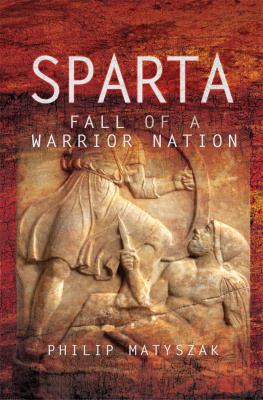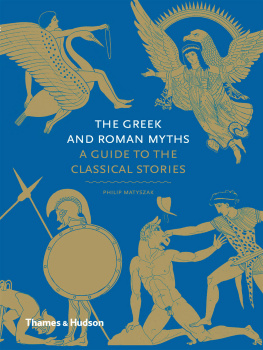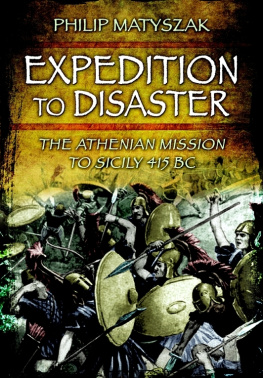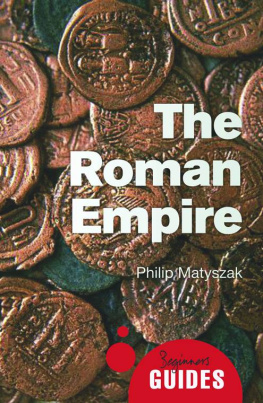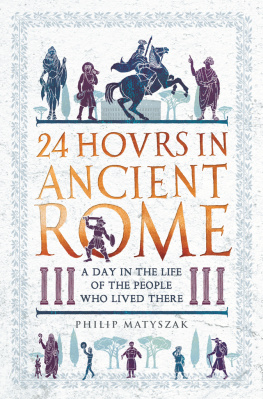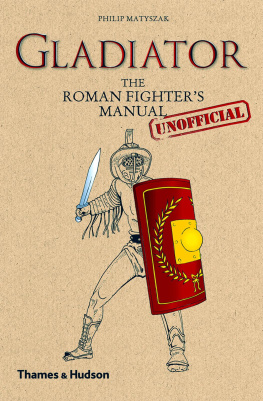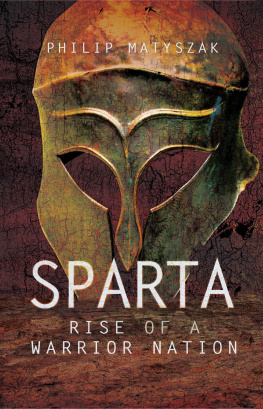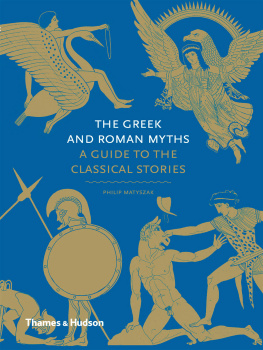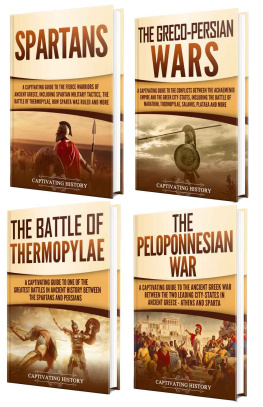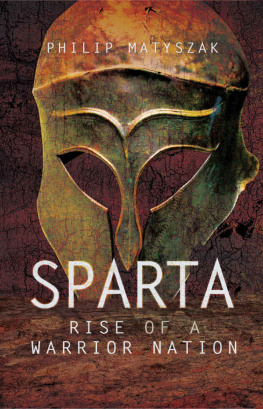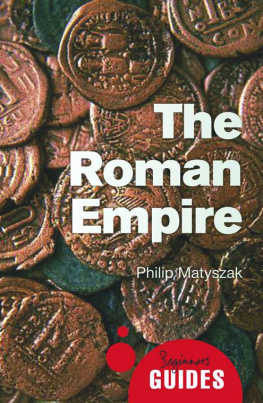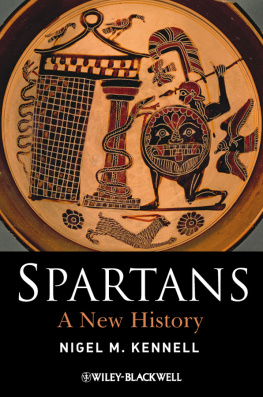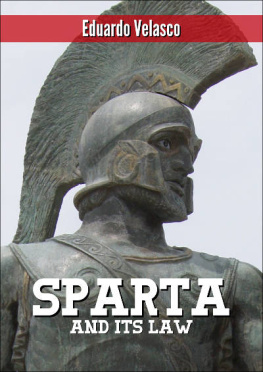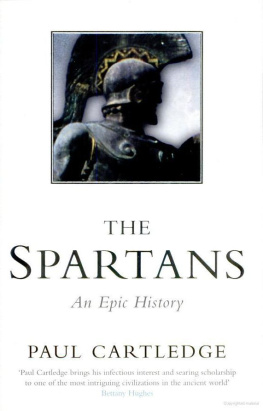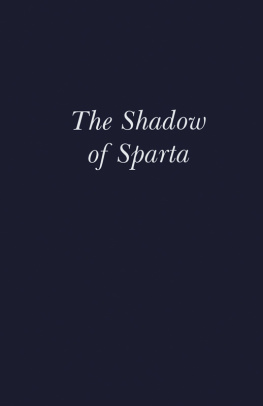Pagebreaks of the print version

Sparta
Sparta
Fall of a Warrior Nation
Philip Matyszak
First published in Great Britain in 2018 by
PEN & SWORD MILITARY
an imprint of
Pen & Sword Books Ltd
47 Church Street
Barnsley
South Yorkshire
S70 2AS
Copyright Philip Matyszak, 2018
ISBN 978-1-47387-472-5
eISBN 978-1-47387-474-9
Mobi ISBN 978-1-47387-473-2
The right of Philip Matyszak to be identified as the author of this work has been asserted by him in accordance with the Copyright, Designs and Patents Act 1988.
A CIP catalogue record for this book is available from the British Library.
All rights reserved. No part of this book may be reproduced or transmitted in any form or by any means, electronic or mechanical including photocopying, recording or by any information storage and retrieval system, without permission from the Publisher in writing.
Pen & Sword Books Limited incorporates the imprints of Atlas, Archaeology, Aviation, Discovery, Family History, Fiction, History, Maritime, Military,Military Classics, Politics, Select, Transport, True Crime, Air World, Frontline Publishing, Leo Cooper, Remember When, Seaforth Publishing, The Praetorian Press, Wharncliffe Local History, Wharncliffe Transport, Wharncliffe True Crime and White Owl.
For a complete list of Pen & Sword titles please contact
PEN & SWORD BOOKS LIMITED
47 Church Street, Barnsley, South Yorkshire, S70 2AS, England
E-mail:
Website: www.pen-and-sword.co.uk
List of Plates
A Spartan points out a drunken slave to his sons; painting by Fernand Sabatte, 1900.
A Persian combat engineer mounted on a donkey.
The entrance to the Temple of Apollo at Delphi.
A Persian archer, from an Athenian black-figure vase.
Greek infantry depicted on a frieze.
The Leonidian in modern Sparta.
The view across Sparta to Mt Parnon.
A contemporary womans jewellery.
A mother arms her son before battle.
Mount Ithome depicted in an 1882 woodcut.
The medieval monastery at Mystras.
King Nabis, portrait taken from a contemporary coin.
Philip II of Macedon.
The Spartan acropolis looking west across modern Sparta.
Modern Sparta with the Taygetos range in the background.
The remains of the theatre, as seen from the Spartan acropolis.
The remains of the walls of Sparta.
A single olive tree of tough wood, illustrating the difficulty of destroying even a few acres of such trees.
Glossary
| the Spartan system of raising and educating children. |
| the council of Elders, roughly analogous with a senate. |
| a military governor of a town or area. |
| those bound by the Spartans in a condition between serfdom and slavery. |
| the Equals full Spartan citizens. |
| land held by a Spartiate to pay for his upkeep. |
| Spartan spies and assassins. |
| non-Spartiates brought up under the agoge system. |
| naval commander. |
| non-Spartans living in Laconia and subject to Sparta although nominally independent. |
| army or phalanx commander. |
| a proposal put to the assembly of the Spartan people. |
| a long pike adopted by Philip II of Macedon. |
| the top rank of Spartan society. |
| civil strife up to and including civil war. |
| a general. |
| the Spartan military mess. Non-payment of mess fees reduced a Spartiate from that rank. |
| Tremblers survivors of a losing battle. Again, this title cost a Spartiate his rank. |
Introduction
This book is a history of the fall of Sparta. In the chapters to come, we follow Sparta over the course of three centuries as the state descended from being a great power, admired, respected and feared, to a petty state in the Peloponnese, vulnerable to predatory neighbours and almost universally scorned and disliked. In Greek, the word historia means inquiry and that inquiry is at the heart of this book. What happened to Sparta? How did the state fall so low? Was it preventable, and what lessons can we learn from that fall?
This inquiry starts in the aftermath of the battle of Plataea in 479 BC . At this time Sparta was the undisputed leader of Greece. How this leadership was lost, and along with it Spartas moral authority, is one of the themes we shall address. We shall also see how the relentless focus of Spartas leaders on what was good for Sparta, and for Sparta alone, was both shortsighted and in the long run actually very bad for Sparta.
The Peloponnesian War should have allowed Sparta to secure the dominance of Greece in the same way that the Pyrrhic War established Romes control of Italy. Yet Rome went on to found an empire, while Sparta proceeded towards a shambolic collapse. Much of the content of this book involves the Peloponnesian War and its aftermath. This is because it is important to show why, although Sparta seemed to emerge from the conflict triumphant, this was a very different victory from that which Sparta had won over the Persians in the previous century. Sparta emerged from fighting off the Persian invaders as a self-confident society, and a beacon for the Greeks of the day. After the Peloponnesian War Spartas moral authority was in tatters, its society fractured, and its political capital squandered. Sparta won that war, but at the same time it lost Greece.
As we follow Spartas attempts to maintain the hegemony of Greece after the Peloponnesian War, the intellectual sterility of the state is revealed as never before. Athens was far from admirable in very many ways, but no one in Greece denied that Athens had much to offer. In the arts, in science and in philosophy, the Athenians were pushing the human race forward with a boundless (and often disturbing) intellectual freedom and ambition. At first Sparta seemed also to stand for something the nobility of sacrifice, the power of discipline and the use of these attributes to fight for the freedom of tiny Greece against a huge and expansionist empire.
Yet in exchange for domination in Greece, the Spartans traded away exactly those qualities for which their city was admired and traded them to the Persians in exchange for political support and a lot of money. Thereafter Sparta offered only a mindless conservatism combined with an amoral militarism which had no higher purpose than maintaining Spartas hold on power.
Unsurprisingly, the rest of Greece rejected this vision (if vision is the right word here), and rejected it vehemently. When Thebes rose to ascendancy, what Thebes stood for was that It Was Not Sparta. By then Sparta was so disliked that much of Greece fell in behind Thebes on that count alone. Tellingly, when Thebans in the third century were said to be acting like the Spartans, this was intended and received as a dire accusation. Two centuries before it would have been a high compliment.
At a time when the Romans were expanding their civic body (sometimes by the wholesale incorporation of entire communities, however unwilling), the Spartans completely refused to share their citizenship or their power not with their allies, not with the other people of Laconia, and not even with their own inferior citizens. There were very many ways by which a Spartiate could drop from his rank, and other than by birth almost none by which that rank could be attained. As we shall see, this meant that over the centuries the privileges of Spartiate rank belonged to a small and ever-shrinking circle. A constant theme in this book is the ever-diminishing number of , and their reluctance to expand this group or share its benefits, even though this exclusionism was very much against the welfare of the state which the Spartiates claimed to embody.

